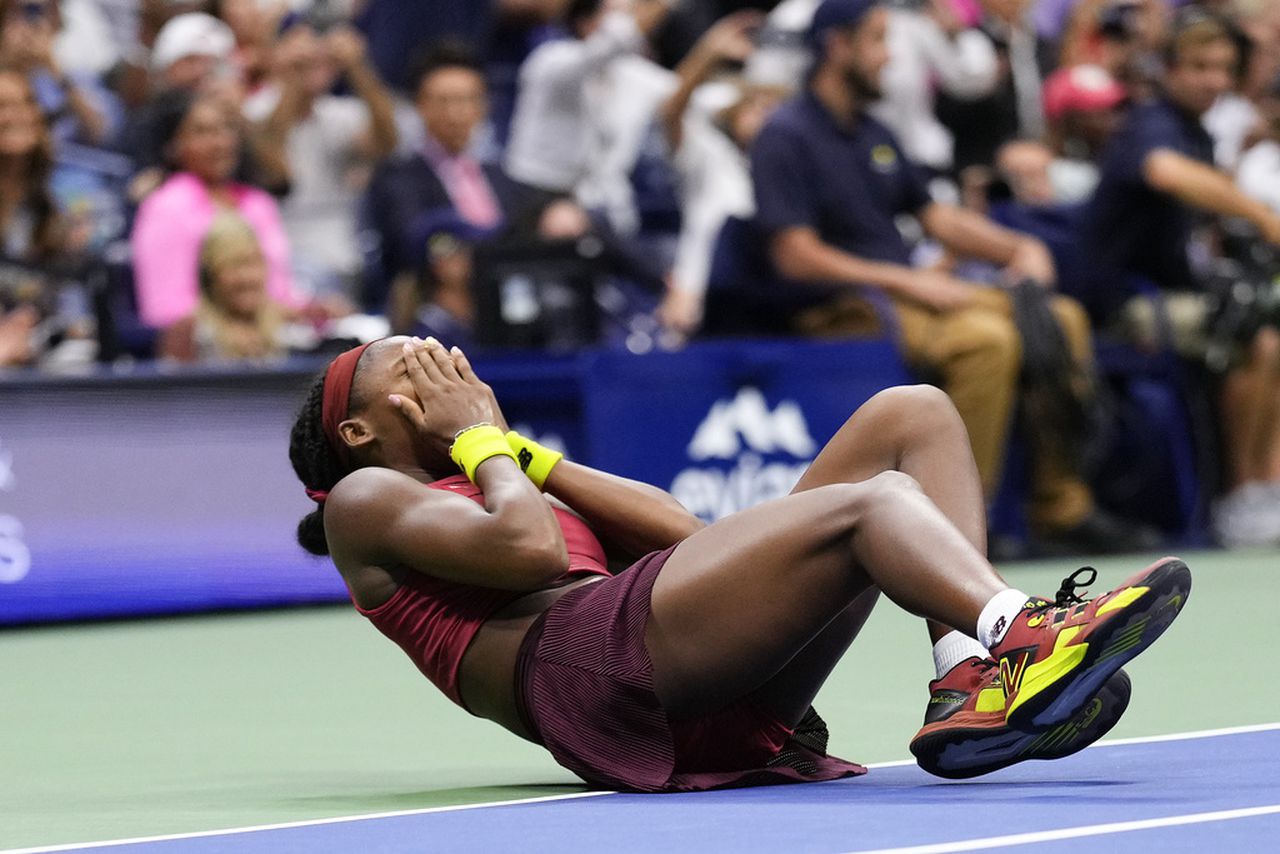
NEW YORK — Coco Gauff set aside a so-so start and surged to her first Grand Slam title at age 19, coming back to defeat Aryna Sabalenka 2-6, 6-3, 6-2 in the U.S. Open final on Saturday to the delight of a raucous crowd that was loud from start to finish.
Gauff, who is from Florida, is the first American teenager to win the country’s major tennis tournament since Serena Williams in 1999. If last year’s U.S. Open was all about saying goodbye to Williams as she competed for the final time, this year’s two weeks in New York turned into a “Welcome to the big time!” for Gauff.
This is the sort of triumph that had — fairly or not — been expected of Gauff ever since she burst onto the scene at 15 by becoming the youngest qualifier in Wimbledon history and making it to the fourth round in her Grand Slam debut in 2019.
She reached her initial major final at last year’s French Open, finishing as the runner-up, and now has earned the biggest trophy of her still-nascent career. Gauff earned a 12th consecutive victory and 18th in her past 19 matches dating to a first-round exit at the All England Club in July.
The No. 6-seeded Gauff did it Saturday by withstanding the power displayed by Sabalenka on nearly every swing of her racket, eventually getting accustomed to it and managing to get back shot after shot. Gauff broke to begin the third set on just one such point, tracking down every ball hit her way until eventually smacking a putaway volley that she punctuated with a fist pump and a scream of “Come on!”
Soon it was 4-0 in that set for Gauff. At 4-1, Sabalenka took a medical timeout while her left leg was massaged. Gauff stayed sharp during the break — it lasted a handful of minutes, not the 50 during a climate protest in the semifinals — by practicing some serves.
When they resumed, Sabalenka broke to get within 4-2. But Gauff broke right back, and soon was serving out the victory, then dropping onto her back on the court. She soon climbed into the stands to find her parents and others for hugs.
“You did it!” Gauff’s mom told her, both in tears.
Sabalenka came into the day with a 23-2 record at major tournaments in 2023, including her first Grand Slam title at the Australian Open in January. The 25-year-old from Belarus already was assured of rising from No. 2 to No. 1 in the WTA rankings for the first time next week.
But she was reduced to the role of foil by the fans. As often happens when an American plays in America, Gauff was the recipient of by far the most support from the seats in 23,000-capacity Arthur Ashe Stadium. Her pre-match TV interview, shown on the video screens in the arena, was drowned out by the sound of applause and cheers reverberating off the closed retractable roof.
Even in the early stages, winners by Gauff were celebrated as if the match were over. So were Sabalenka’s miscues. Her faults and, especially, double-faults — and there were six in all, three in her first two service games alone, plus another to hand over a break in the second set — and assorted other mistakes, including one over-the-shoulder backhand volley into the net and what appeared to be a much simpler forehand volley.
By the end, Sabalenka had made 46 unforced errors, far more than double Gauff’s total of 19.
Here’s another way to view it: Gauff only needed to deliver 13 winners to accumulate 83 points Saturday.
Sabalenka came out doing what she does, pretty much no matter the setting, the surface or the stakes: pounding shots as hard as she can and punctuating them with loud exhales.
That’s not to say it’s all she can do. One particular second-set point demonstrated that, when Gauff hit a lob that Sabalenka chased down with her back to the net and, spinning around, responded with a lob of her own for a winner.
When Sabalenka has everything calibrated just right, it’s difficult for any foe to handle her power — even someone as speedy, smart and instinctive as Gauff, whose get-to-every-ball court coverage managed to keep her in points few other players would be able to extend.
And when Sabalenka misses the mark, she sure does miss. After miscues Saturday, she frequently would slap her thigh or glance toward her entourage while muttering or shaking her head.
Neither player hit all the right notes at the start, perhaps owing to their contrasting styles and the mix of Sabalenka’s superb offense against Gauff’s exemplary defense.
They traded early breaks to 2-all, but Sabalenka then grabbed the next four games to take that set. During that stretch, there was a thrilling point that had the audience making noise before it was over. Gauff scrambled to keep getting Sabalenka’s strokes back over the net, including somehow deflecting a booming overhead on the run, before a second, unreachable overhead bounced off the ground and into the stands.
Sabalenka raised her left hand and wagged her fingers, telling the folks in the stands to give her some love.
But soon, Gauff was playing better, Sabalenka was off-target more, and the love was being showered only on one of them, the sport’s newest Grand Slam champion.






